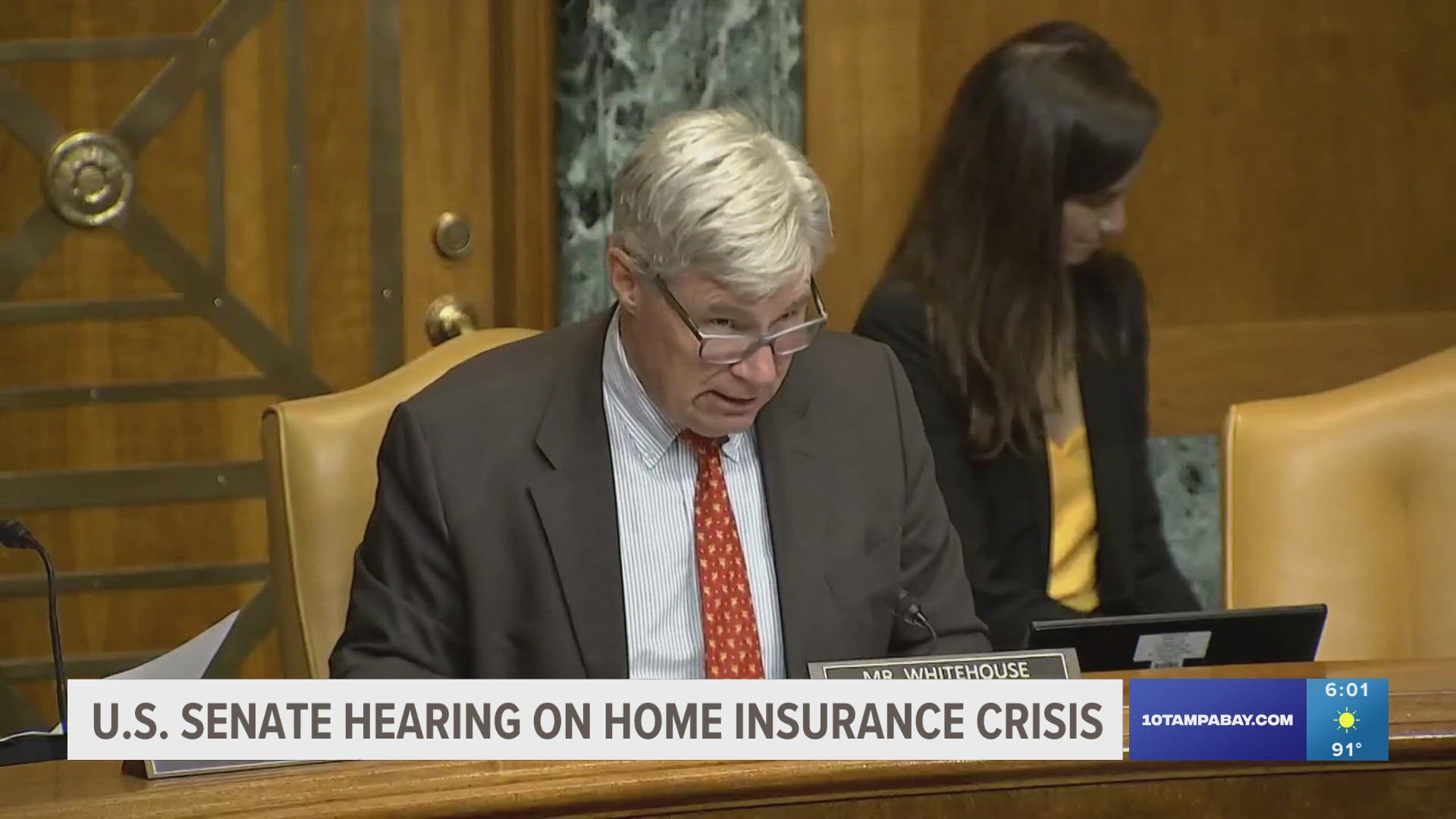WASHINGTON, D.C., USA — While insurance officials in the state say they’re starting to see signs of market stabilization, the ongoing property insurance crisis in Florida took center stage Wednesday on Capitol Hill.
Lawmakers on the Senate Budget Committee held a hearing looking at the rising costs of home insurance in Florida and beyond and how factors, like inflation and climate change, may continue to shake the unsteady market and impact the economy nationwide.
“Our proposed renewal for 2023 was more than $8,000,” testified Tallahassee resident Deborah Wood, going on to describe the impact spiking insurance costs have had on her and her family.
“At this stage of our lives, we are not willing to risk our financial well-being by buying a home that one day may be uninsurable or craters in value in a housing market fueled by the insurance crisis,” Wood added.
Those concerns were echoed by committee chairman Senator Sheldon Whitehouse, D-Rhode Island. “This all looks like an insurance market that is swirling in the drain,” said Whitehouse.
“What happens when insurance companies go bust or don't renew policies or pull entirely out of a state, families lose insurance, they can't find a decent policy. They can't afford what's available. Some even pack up and move away. Some ended up with state-backed insurers of last resort, which may or may not be solvent,” added Whitehouse, who earlier this year launched a probe into the state-backed Citizens Property Insurance.
“If it has to pay out claims that exceed its reserves, Citizens can levy a surcharge on Florida insurance policyholders across the state. Good luck with that,” said Whitehouse.
Citizens brass have pushed back on concerns lobbied by Whitehouse in two separate letters.
The so-called “insurer of last resort” says they are actively working to lower their number of policies and heading into this hurricane season, “will have the reserves and reinsurance coverage to handle a 1-in-100-year storm without having to levy assessments on non-Citizens policyholders.”
However, Senator Whitehouse is questioning where that heads in the future, in Florida and other states, as private insurers grapple with a growing risk from climate change.
“Last year, the U.S. experienced 28 separate billion-dollar extreme weather events,” Whitehouse added.
While Republican committee members agreed that, "Florida's insurance market is completely screwed up,” as Senator Ron Johnson, R-Wisconsin put it, how to address the unaffordability of insurance so it's not a burden on taxpayers is where parties differ.
Johnson added it's not climate change, but federal spending and inflation as the main factors driving up the costs.
“There's going to have to be a broader analysis of what we have to do to rein in our fiscal challenges,’ said Sen. Mitt Romney (R-Utah.)
Experts testified Wednesday that investing in infrastructure and other measures to mitigate damage in weather-prone areas is a necessary step forward, as lawmakers work through the upcoming budget.
“We need to start thinking about future-proofing our building codes and land use policies,” said Rade Musulin, an actuary with Finity Consulting. “Certainly doing things to reduce the vulnerability of properties and improve their resilience is important.”
In the meantime, Florida homeowners can soon apply for grant funding to harden their homes. The application window for the My Safe Florida Home Program opens back up July 1.
The MSFH program says applications will be accepted and prioritized in 15-day increments.
- Low-income homeowners age 60+ – July 1 – July 15
- Low-income homeowners of any age – July 16 – 30
- Moderate-income homeowners age 60+ – July 31 – Aug. 14
- Moderate-income homeowners of any age – Aug. 15 – 29
- All other eligible Florida homeowners – Aug. 31
What is the My Safe Florida Home Program?
The recommendations are for features like roofing materials, storm shutters, and hurricane clips among others.
Getting inspections can help homeowners save money on insurance premiums, and homeowners who receive the free wind mitigation inspection can also apply for grant funds to pay for the improvements.
The state will match up to $10,000 of the costs homeowners pay for home improvements designed to protect against storm damage.
The program was relaunched in 2022 and has been previously funded three times. Today a backlog of applicants remains, and the injection of funding will help address that.
For more information about the program, click here.

